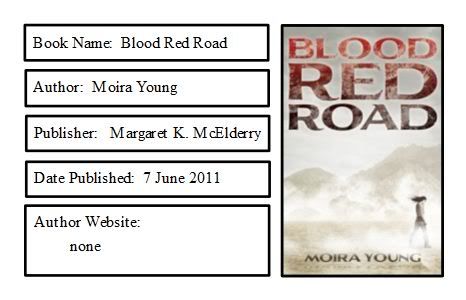
Saba has spent her whole life in Silverlake, a dried-up wasteland ravaged by constant sandstorms. The Wrecker civilization has long been destroyed, leaving only landfills for Saba and her family to scavenge from. That's fine by her, as long as her beloved twin brother Lugh is around. But when a monster sandstorm arrives, along with four cloaked horsemen, Saba's world is shattered. Lugh is captured, and Saba embarks on an epic quest to get him back.
Suddenly thrown into the lawless, ugly reality of the world outside of desolate Silverlake, Saba is lost without Lugh to guide her. So perhaps the most surprising thing of all is what Saba learns about herself: she's a fierce fighter, an unbeatable survivor, and a cunning opponent. And she has the power to take down a corrupt society from the inside. Teamed up with a handsome daredevil named Jack and a gang of girl revolutionaries called the Free Hawks, Saba stages a showdown that will change the course of her own civilization.
Blood Red Road has a searing pace, a poetically minimal writing style, violent action, and an epic love story. Moira Young is one of the most promising and startling new voices in teen fiction.
This book was hard to get into at first. I’m not sure where an Australian writer living in England learned an Ozark accent, but she had it down pretty well. That was really what was so harsh about this book: the voice of the narrator, Saba, is written in accent as if she was speaking to you. There are no quotation marks, only ‘But no I said.’ Add in the grammatical idiosyncrasies and a liberal dose of misspelled words and the result is a book that’s very difficult to get into since it’s not the way we’re used to reading books. As you read, though, the strangeness of the narrative voice forms a strong basis for the character and development of Saba. It turns from a strange way of writing to an quirk of the lead, something that shows where she came from and how much she has overcome to get to where she is. After I got over the narrative voice and started to appreciate it I found a really interesting story. Saba is harsh, uneducated, mean and unfair to her younger sister, and downright rude to most people. Somehow, though, we grow to love her anyway. I love how the narrator gives her a pet crow, Nero, from the beginning of the book. He is so loveable and smart that the reader can’t help but like Saba for his sake. Her quest to rescue her brother in the harsh, post-apocalyptic world drives the reader to look towards Lugh as well and forgive Saba of any small mistakes along the way. After all, she’s got bigger things to worry about than offending a crazy man on a boat. As Saba fights in gladiatorial battles I am still somehow rooting for her. After I met Jack I started rooting for him, too. The Free Hawks also get two thumbs up. I love a good tale of smart warrior women. In fact, I think the only thing I didn’t like was Saba’s treatment of Emmi. I loved seeing Emmi grow as a character, and even though Saba tried to deny it and hold her down as much as possible Emmi keeps rising to the occasion and showing that she’s got just as much grit as Saba does. There was also the problem with the Pinches. They didn’t seem incredibly realistic, and once you’ve reached the end of the books a lot of their actions seem insensible and illogical, making them seem more like plot devices than real characters. However, once I got past the language that is my only real complaint, which means this is an excellent story with no major drawbacks, a few different but equal examples of strong females, and an excellent romance story. I highly recommend it to everyone who can get past the writing style.


No comments:
Post a Comment